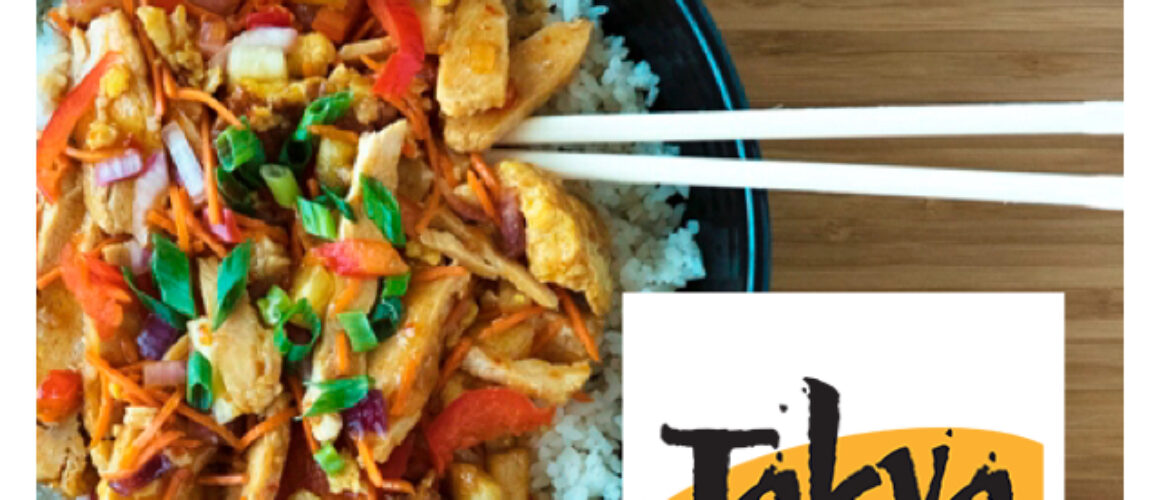Tokyo Joe’s: Recipe For Change and a Healthy America
Papa John’s Pizza just announced that they are now offering organic toppings on their pizzas.
They aren’t the first fast food chain to get in on the action. Quick service restaurants (known as QSRs) are also making changes in response to consumer demand.
I recently spoke with the CEO of Tokyo Joe’s, Mark Davis. Several families had reached out to share how much this chain is doing for those with food allergies.
Their motto is “Eat Good. Feel Good” and after an hour on the phone with the CEO, it is obvious that they live it.
This team was way ahead of its time. The founder, Larry Leith, who started the restaurant in 1996 was a professional mobile skier and cyclist, living in Colorado.
It was in his DNA to recognize that our food is our fuel and to find the cleanest ingredients possible. Why? It enhanced athletic performance.
His thought? Let’s come up with a menu without fries, without preservatives, that gives everyone a chance to eat and feed their families healthy food at an affordable price.
Their plan was to offer healthy portions at a good value.
As I spoke with the CEO, Mark, it was obvious that these guys live and breathe it. He spoke about their labels: V – for the vegan and dairy allergy community, GF – for those looking for gluten-free options and those with Celiac Disease, and sugar-free. In other words, they are addressing the needs of 21st century consumers.
However, the reason that I reached out to him in the first place is because of how they handle those with food allergies.
As the CEO, shared: “One of the opportunities that we saw, with us being an Asian-concept chain, is that we have several ingredients that are nuts. How do we look at sauces? Menu items? Things that work for everyone?”
His answer was amazing: they invite food allergy families in to ask them about how they clean the line and prepare the foods for those with allergies. But what was more impressive is that he remembered the families by name, both the names of the moms and the names of the kids. He was so proud to forward correspondence he’d received because of how the company chose to address it.
Rather than run from these consumers, they were embracing them.
When I asked how he made it work, he said that they try to hire people and give them the autonomy to help customers that come in. To this CEO what is critical is that it comes back to the team members, that they have buy in and ownership. Everyone is invested in the outcome, not just the executives in the offices in downtown Denver.
So why do these guys get it at such a deep level? Maybe because the CEO has a 6 year old or maybe because he has a college aged athlete who completely understands how food impacts his performance on the field.
Or maybe, because as he shared, “I was a Panera guy for a long time and helped them grow west, Canada. We saw the opportunity to be healthier.”
They cater not only to families and those with food allergies, but also to body builders, pro-cycling, mountain bike team, cancer patients, those with Celiacs and more.
So where are they (besides my hometown of Boulder, Colorado)? They will have 48 stores by year end. They had just 28 stores (all Colorado-based), when the founder sold the company to Gridiron Capital.
Now, they are operating in Dallas (4), Ft Worth, Phoenix, and soon to be Laguna Niguel, California
They tend to flock to warm weather places, beyond Colorado, because they learned that when it snows, “we don’t do as well, because it’s not comfort food. We do well in the sun.” They are good food for those with a healthy lifestyle (or those wanting one).
In light of the recent United Airlines disaster, we spoke a lot about how they give employees at the store level the autonomy to do the right thing.
The CEO also shared that the general managers also get a ticket to Hawaii every year, and the founder’s Hawaii house for a week. That’s some kind of compensation and recognition for work well-done!
Their marketing tends to be grassroots. For example, next week in California, there will be a ribbon cutting, the mayor of Laguna Nigel will join, as will the Rotary Club.
They make healthy food affordable and accessible to those who may not always get it. Not just for their customers, but also, in the early years, Tokyo Joe’s prided itself on hiring “the few, the proud, the fierce, people that couldn’t get jobs other places.”
Their model is a powerful one, so well-positioned for 21st century families and food trends. As Papa John’s goes organic, I truly hope to see Tokyo Joe’s and others integrate organic into their menu, too.
Why? Because in Papa John’s own words,
“Last year, our research showed that more than 50% of American households purchase organic ingredients. And based on recent trends, about 20% of all produce will come from certified organic farms by 2020. That was telling us something about our customers’ needs.”
When I asked Tokyo Joe’s CEO how he was able to retain and grow such a powerful vision, he said,
“You have to give people something to believe in, something to be part of that is bigger than the job. “
I couldn’t agree more. We are the change.
